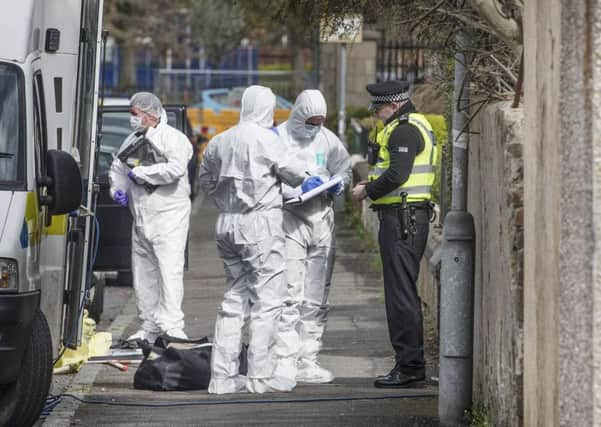Violent crime in Scotland '˜higher than official reports'


Niven Rennie, who took the helm at the Violence Reduction Unit (VRU) in the summer, told Scotland on Sunday parts of the country still experience “unacceptable” levels of violence, with A&E departments dealing with far higher numbers of serious assaults than those reported to police.
The VRU, which has pioneered a public health approach to tackling violence in the west of Scotland, believes violent crime could be significantly higher than the official recorded crime statistics suggest.
Advertisement
Hide AdAdvertisement
Hide AdIts work has received international attention since the turn of the year after 80 people were stabbed to death in London in 2017, a quarter of them in their teens.
Metropolitan Police Commissioner Cressida Dick visited the unit in February, while forces as far afield as Sweden and New Zealand have expressed an interest in learning from its methods.
However, it was a one-minute video clip from the World Economic Forum that really brought the work of the VRU to a wider audience when it went viral on social media last month.
Highlighting the 60 per cent drop in homicides in Glasgow over the past decade, the video led to accusations from some that Scotland’s media had ignored a “good news story”.
Despite the successes of the VRU and its partners, however, stabbings continue to account for around half of all homicides in Scotland.
Speaking from his office in the VRU’s Glasgow HQ, Rennie said: “One of the reasons we’re in the press, particularly in London, at the moment is because we’ve had an amazing turnaround from ten years ago, but violence in Scotland is still running at a level where we as a progressive society should be concerned.
“I get figures on a daily basis from across Scotland and we still see too many serious assaults, too many attempted murders. Yes, it’s a good news story that we’ve reduced violence substantially, but not to the level where we can say we’ve cracked it – that would be wrong.”
According to official Scottish Government statistics, recorded crime is at its lowest level since the mid-1970s. But the VRU maintains the level of crime in society is not reflected in the figures.
Advertisement
Hide AdAdvertisement
Hide Ad“We’re still at the stage where we see more victims of violence coming to A&E than we do to the police,” Rennie said. “We know the statistics are as accurate as they can be, but there’s a lot of crime going unreported.”
He added: “When someone from government stands up and says crime is at a 43-year low, I always say it’s recorded crime that’s at a low.”
Taking a 2002 World Health Organisation report on violence and health and an anti-gang initiative first piloted on the streets of Boston in the 1990s as its starting points, the VRU set out in 2005 to help Glasgow shed its murder capital tag.
It became the only police force in the world to adopt a public health approach to violence and knife crime, treating it like a disease to be cured with education, health and social work interventions.
Rennie, a former chief superintendent, said there were early indications some forms of violent crime, particularly street robberies, were on the rise again.
He bemoaned the decision made last year to end the controversial police tactic of “consensual” stop-and-search, which allowed officers to stop members of the public and carry out a search by simply first asking their permission.
“My view on stop-and-search has long been articulated,” he said. “I think stop-and-search was a particularly useful policing tool.
“Searching properly, searching when it is intelligence-led and appropriate, no doubt leads to a reduction in violence.
Advertisement
Hide AdAdvertisement
Hide Ad“If somebody is inclined to carry a knife and they know they are going to get searched, they are not going to carry it. When that threat is removed, they might become more confident. Based on my 30 years’ police service, that’s what happens.”
The work of the VRU was born partly out of frustration, when other more short-term approaches had been shown not to work. Throughout the 1990s and early 2000s, Strathclyde Police launched a series of anti-knife initiatives such as Operation Blade and Operation Spotlight, which reduced the number of weapons on the streets, but did very little to change the culture of knife carrying among disaffected young men.
In 2005, Karyn McCluskey, then an analyst for the force, wrote a report on violence reduction that included an exasperated recommendation: “Do something different”.
It was to become the unofficial mission statement of the VRU, which McCluskey would eventually lead alongside her colleague John Carnochan.
Rennie believes Operation Sceptre – the anti-knife initiative run by the 43 police forces in England and Wales earlier this year – is not dissimilar to those Strathclyde Police operations of 20 years ago which failed to have a lasting impact.
“I was at a briefing for Operation Sceptre, and if I closed my eyes it could have been Spotlight they were talking about. These initiatives would have an impact for a short time. You would see [knife crime] go down and then go straight back up again.”
While the VRU’s work has predominately focused on Glasgow, there are now plans to extend its reach with a new project in Edinburgh, working with prisoners who spent time in care while growing up.
Asked if all the media attention on the VRU’s success is likely to make his team complacent, Rennie said: “Why would we be complacent? There’s still too much violence. It’s very nice to get international recognition for what we’ve done, but we certainly won’t rest on our laurels.”